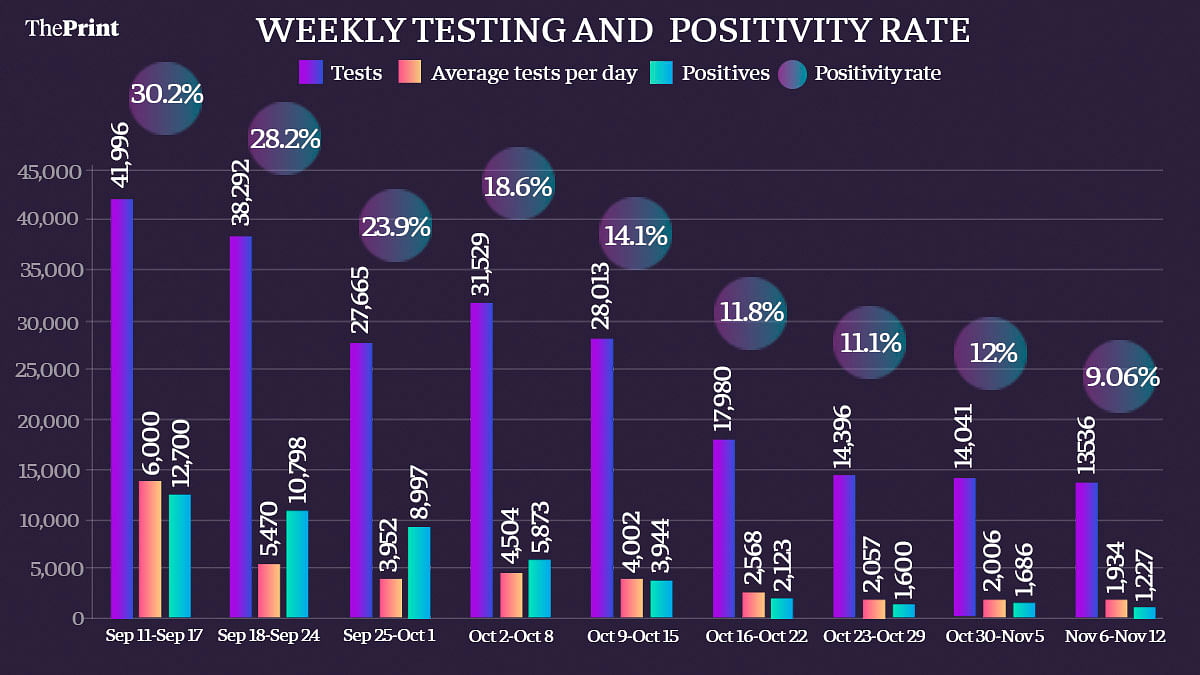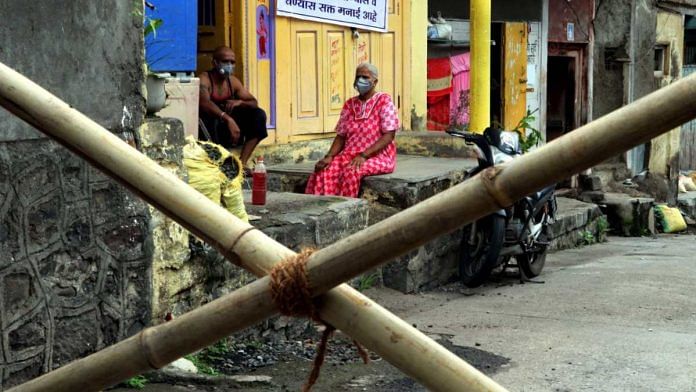Mumbai: Pune is among the cities worst affected by the Covid-19 pandemic with the highest number of cases and deaths per million, but testing in the western Maharashtra city has plummeted nearly 70 per cent over the past two months.
The number of Covid tests in the city steadily dropped from 41,996 in the 11-17 September week to just 13,536 in the 6-12 November week, just before the Diwali weekend. This is a fall of 67.76 per cent.
This translates to daily testing of less than 2,000 — a drop from about 6,000 samples that Pune was testing two months ago, according to data from the Pune Municipal Corporation (PMC).
The number of tests being conducted slumped further over the Diwali weekend as was the case in all major cities across the country.
According to the PMC data, while 2,064 tests were conducted on 13 November, a day before Diwali, the numbers came down to 1,824 on 14 November, 1,111 on 15 November and 1,032 on 16 November.
PMC officials said testing has gone down because the number of new Covid-positive cases has also decreased as compared to two months ago. They, however, said they plan to ramp up testing by focusing on “super spreaders” in the coming days.
Pune, which had reported one of the first Covid-positive cases in the country, has the worst record , with 51,857 cases per million and 1,086 deaths per million so far.
Pune has so far recorded 1,65,837 cases, of which 4,475 are currently active, according to the PMC data as of Thursday.
Serological surveys conducted in Pune have shown a massive spread of the infection, and a new study conducted in five of the city’s administrative units has found that 85 per cent of the people who had been infected by the coronavirus seem to have developed protective antibodies, in an indication of herd immunity.
Dr Avinash Bhondwe, president of the Indian Medical Association chapter in Maharashtra, said: “The civic body should not have reduced testing. Eighty per cent of the people are anyway asymptomatic and actual contact tracing on the ground is very poor.”
He added: “With a drop in the number of Covid-positive cases, people as well as the government seem to have got a bit relaxed.”

Also read: Meet the Pune woman behind the first Indian Covid-19 testing kits
Testing low due to fewer cases, PMC says
Rubal Agarwal, Additional Municipal Commissioner of PMC, said tests have reduced mainly because new Covid cases have come down compared to two months ago.
“In Pune, we are tracing 14 people for every positive patient. We segregate them into high-risk contacts and low-risk contacts. All high-risk contacts and symptomatic low-risk contacts are tested. Now, if the number of cases are fewer, the number of high-risk contacts too will be lower and that pulls down the number of tests,” he told ThePrint.
Agarwal added 70 per cent tests are RT-PCR (Reverse Transcription Polymerase Chain Reaction), considered to be the gold standard for Covid testing with a high sensitivity, while the rest are rapid antigen tests, which give faster results, but have lower sensitivity and can throw up false results.
She added other factors such as international arrivals in Pune getting tested in other cities too have impacted the overall testing numbers in the city.
The number of new Covid cases in Pune has steeply dropped from 12,700 in the 11-17 September week to 1,227 in the 6-12 November week.
Agarwal, however, said the civic body anticipates a spike in cases as Diwali is over and plans to ramp up testing by focusing on “super spreaders” in the next few days.
“We will start with teachers, as we have to reopen schools from the ninth to the 12th standards Monday. After that, we will appeal to shopkeepers, hawkers and our public bus transport drivers and conductors to come forward and get tested,” Agarwal said.
Dr Bhondwe said aggressive testing of super spreaders should have been planned when the number of cases were on the decline to prevent a spike.
Also read: Pune hospital reports India’s ‘first’ case of Covid transmission from pregnant mother to baby
Drop in positivity rate
Along with a drop in the number of tests, the positivity rate too has steadily declined. The city had recorded a positivity rate as high as 30.2 per cent two months ago in the 11-17 September week.
This fell to 14.1 per cent in the second week of October and further dwindled to 9.06 per cent in the week before Diwali.
Dr Archana Patil, Director, Health Services, said: “The positivity rate dropping is a good indication, but this trend needs to be sustained. There seems to be a spike in cases after Diwali everywhere, including in Pune.”
Maharashtra Medical Council chief Dr Shivkumar Utture, however, said simply saying that the number of positive cases are lower is not a good enough reason to reduce testing.
“The positivity rate is still around 10-15 per cent today, which means that the testing is not enough. The world over, the norm is that we can consider that we are adequately testing only if the positivity rate is less than five per cent,” he said.
Pune recorded 411 new positive cases Thursday.
Also read: India’s mRNA-based Covid vaccine won’t need ultra cold conditions for storage — Pune firm






